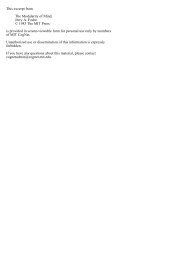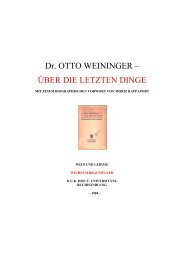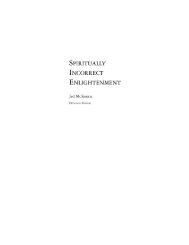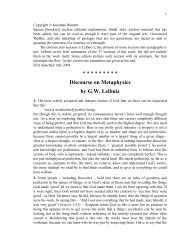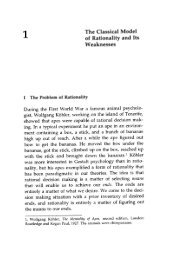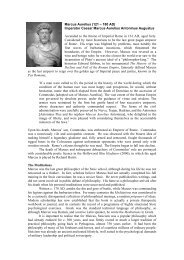- Seite 1 und 2: Otto Weininger Sex and Character wi
- Seite 3 und 4: Sex and Character - with interlinea
- Seite 5 und 6: Mitleid Mitleidsmoral Mutterrecht N
- Seite 7 und 8: V VORWORT PREFACE ZUR ERSTEN AUFLAG
- Seite 9 und 10: Ihre Ehrfurcht vor der Erfahrung wi
- Seite 11 und 12: only in a few instances [to do]. We
- Seite 13 und 14: XIII INHALTSVERZEICHNIS TABLE OF CO
- Seite 15: Empfinden der Geschlechtlichkeit.
- Seite 19 und 20: Gleichheit oder Gleichstellung. P.
- Seite 21 und 22: als die Menschheitsfrage. Untergang
- Seite 23 und 24: Only slowly do we bring them into t
- Seite 25 und 26: Doubtless the skeleton of the hand
- Seite 27 und 28: Weibes auch beim Manne sämtlich ir
- Seite 29 und 30: mathematisch gesprochen, eine Häuf
- Seite 31 und 32: Reality displays much more a fluctu
- Seite 33 und 34: But where is the boundary to be dra
- Seite 35 und 36: weibliche Körperbewegung und die d
- Seite 37 und 38: Die innere Sekretion der Keimdrüse
- Seite 39 und 40: absolute Konformität gibt es in de
- Seite 41 und 42: Das Bestehen der originären sexuel
- Seite 43 und 44: Additionally, they could also possi
- Seite 45 und 46: The knowledge of averages, which up
- Seite 47 und 48: 31 III. Kapitel Chapter III Gesetze
- Seite 49 und 50: Jedermann weiß ferner aus eigener
- Seite 51 und 52: Ist in ihm aber ein bestimmter grö
- Seite 53 und 54: Fast ein jedes Liebespaar, dem man
- Seite 55 und 56: damit die Mannigfaltigkeit nicht er
- Seite 57 und 58: vollkommen illusorisch ist, indem d
- Seite 59 und 60: 44 alle mitspielenden Faktoren und
- Seite 61 und 62: The fact that all liaison of male a
- Seite 63 und 64: viel schwächer sind als selbst bei
- Seite 65 und 66: Admittedly the question of monogamy
- Seite 67 und 68:
53 IV. Kapitel Chapter IV Homosexua
- Seite 69 und 70:
Obwohl diese Auffassung nun viel we
- Seite 71 und 72:
as well as with the female sex. Wer
- Seite 73 und 74:
Erwerbungstheoretiker - die betreff
- Seite 75 und 76:
esprochenen Gesetze; der Päderast
- Seite 77 und 78:
attempt is justified to elevate it,
- Seite 79 und 80:
Der zweite würde vor dem ersten de
- Seite 81 und 82:
weiblich sie ist. This is not only
- Seite 83 und 84:
een thoroughly recognized by Darwin
- Seite 85 und 86:
nothing of physiognomics as a scien
- Seite 87 und 88:
another. Später haben, zuerst beka
- Seite 89 und 90:
Dreikant immer von neuem sich verbl
- Seite 91 und 92:
79 VI. Kapitel Chapter VI Die emanz
- Seite 93 und 94:
Das charakterologische Material, we
- Seite 95 und 96:
physiognomically comes to manifesta
- Seite 97 und 98:
This woman was (insofar as I was ab
- Seite 99 und 100:
Selbst das männlichste Femininum h
- Seite 101 und 102:
In the 10th century, in the 15th an
- Seite 103 und 104:
advocates in the most brutal way to
- Seite 105 und 106:
97 I. Kapitel Chapter I Mann und We
- Seite 107 und 108:
unendlichen Verfilzung. Again and a
- Seite 109 und 110:
directly whatsoever to do with psyc
- Seite 111 und 112:
this has taken on an individual col
- Seite 113 und 114:
106 II. Kapitel Chapter II Männlic
- Seite 115 und 116:
eschreiben in der Lage sei, und kon
- Seite 117 und 118:
Nevertheless the apparently contrad
- Seite 119 und 120:
difference of the deepest significa
- Seite 121 und 122:
Momente herausgehoben, und auch die
- Seite 123 und 124:
conception which one normally attac
- Seite 125 und 126:
gemacht wird, von bedeutender Wicht
- Seite 127 und 128:
einem Holzstoß aus weiter Ferne si
- Seite 129 und 130:
process), so also in the history of
- Seite 131 und 132:
Systems C") zur Erklärung dieser D
- Seite 133 und 134:
Intellektes noch Unklares und darum
- Seite 135 und 136:
content to M, and here catches sigh
- Seite 137 und 138:
genial [see glossary: genial] as th
- Seite 139 und 140:
Heinrich von Kleist hat nach der Pe
- Seite 141 und 142:
spiral convolution. Daher kommt es,
- Seite 143 und 144:
And it must be admitted that, accor
- Seite 145 und 146:
appreciation for all fineness and s
- Seite 147 und 148:
Der Musiker kann, wenn er wahrhaft
- Seite 149 und 150:
145 V. Kapitel Chapter V Begabung u
- Seite 151 und 152:
Therefore religious lessons will re
- Seite 153 und 154:
Annahme, es gebe kein völliges Ver
- Seite 155 und 156:
Desgleichen rührt die "verdummende
- Seite 157 und 158:
There are perhaps only very few peo
- Seite 159 und 160:
particular moments contemporaneous
- Seite 161 und 162:
from which, by virtue of the univer
- Seite 163 und 164:
Der Wunsch nach dem Trank aus dem L
- Seite 165 und 166:
Die andere, heute allgemein adoptie
- Seite 167 und 168:
Dinge unterbrechenden, äußeren Er
- Seite 169 und 170:
Mangel an sonstiger Pietät gegen d
- Seite 171 und 172:
Erschöpfung seines Wesens, doch da
- Seite 173 und 174:
habe, weil es hier viel öfter als
- Seite 175 und 176:
The desire for immortality itself i
- Seite 177 und 178:
Denn was wird durch das Erstauftret
- Seite 179 und 180:
exercise of genius solely in the cr
- Seite 181 und 182:
leistete, jenes kontinuierliche, ni
- Seite 183 und 184:
182 VI. Kapitel Chapter VI Gedächt
- Seite 185 und 186:
sensitivity with accumulated repeti
- Seite 187 und 188:
possess the differentiating ability
- Seite 189 und 190:
Weibes von einem Weibe - und ganz u
- Seite 191 und 192:
thinking beings, interrelates most
- Seite 193 und 194:
er, sei's auch durch äußeren Anla
- Seite 195 und 196:
Menschen faselt, erweitert also nic
- Seite 197 und 198:
Auseinandersetzungen allen Hader um
- Seite 199 und 200:
empiricists - this is not the only
- Seite 201 und 202:
experience which always offers only
- Seite 203 und 204:
This difficult deduction allows, an
- Seite 205 und 206:
middle-class civilization ever want
- Seite 207 und 208:
The fewest - that is, persons of ge
- Seite 209 und 210:
Lärm zu machen, weil der Weltraum
- Seite 211 und 212:
zeitigen Betrieb differentieller Ps
- Seite 213 und 214:
immutability, to observe the eterna
- Seite 215 und 216:
which views the whole world. Vom Ic
- Seite 217 und 218:
Kann der Genius Dinge erkunden, die
- Seite 219 und 220:
which they signify. Ihm sind Meer u
- Seite 221 und 222:
Page], from which Goethe has adapte
- Seite 223 und 224:
another - the foreign I and its vie
- Seite 225 und 226:
itself be an event. Dieser Maßstab
- Seite 227 und 228:
"In der ganzen Schöpfung kann alle
- Seite 229 und 230:
Darum kommt ihm auch das Anderssein
- Seite 231 und 232:
Only through suffering from things
- Seite 233 und 234:
Genius is something that "people of
- Seite 235 und 236:
239 IX. Kapitel Chapter IX Männlic
- Seite 237 und 238:
Paracelsus geschöpft hat, und durc
- Seite 239 und 240:
Aber es ist jetzt zu jener Theorie
- Seite 241 und 242:
not only between a developed, diffe
- Seite 243 und 244:
Maßstab dieser Billigung - die Ide
- Seite 245 und 246:
Diese innere Bedingung ist aufricht
- Seite 247 und 248:
Therefore there can only rarely be
- Seite 249 und 250:
No male criminal has yet really bel
- Seite 251 und 252:
The woman does not respect the pain
- Seite 253 und 254:
Ich komme hierauf noch sehr ausfüh
- Seite 255 und 256:
sie sucht bis ans Ende sich und die
- Seite 257 und 258:
eneidet zu werden. The woman boasts
- Seite 259 und 260:
Selbstbewußtseins", jenes kontinui
- Seite 261 und 262:
pleases him. Und selbst wenn sie ei
- Seite 263 und 264:
Dieses Resultat ist aber für alle
- Seite 265 und 266:
subject could also no longer remain
- Seite 267 und 268:
psychology. Ja, es bleibt ihr fragl
- Seite 269 und 270:
----- 1) Noch hat niemand von Doppe
- Seite 271 und 272:
Während gar manches männliche Ant
- Seite 273 und 274:
280 X. Kapitel Chapter X Mutterscha
- Seite 275 und 276:
I admittedly cannot rightly perceiv
- Seite 277 und 278:
unterliegen. Prostitutes are furthe
- Seite 279 und 280:
as Goethe and Ibsen have portrayed
- Seite 281 und 282:
Ansicht, daß das Weib monogam und
- Seite 283 und 284:
[women are unsettled]. Und es schei
- Seite 285 und 286:
gefunden zu haben. A certain peace,
- Seite 287 und 288:
Essen und Trinken beschafft, um sie
- Seite 289 und 290:
thinkers and artists; the earlier s
- Seite 291 und 292:
her is the deepest self-evidence th
- Seite 293 und 294:
den Dingen setzt, weil sie ihm nur
- Seite 295 und 296:
Weisheit sinnlos, zwecklos, ohne ei
- Seite 297 und 298:
Coquetry is never without connectio
- Seite 299 und 300:
Die Dirne will von allem koitiert w
- Seite 301 und 302:
Sinnes, sie sorgt nicht vor wie die
- Seite 303 und 304:
eligious fantasy may presume to ill
- Seite 305 und 306:
315 XI. Kapitel Chapter XI Erotik u
- Seite 307 und 308:
which concerns both of these men. K
- Seite 309 und 310:
things which at most may be opposin
- Seite 311 und 312:
eauty. Das nackte Weib ist im einze
- Seite 313 und 314:
auch die Schönheit des Weibes nich
- Seite 315 und 316:
spiritual nature and thereby tolera
- Seite 317 und 318:
Erotik des Alls, aus dem Chaos die
- Seite 319 und 320:
as in hate, the idea of his own unw
- Seite 321 und 322:
way. Sie ist der gefährlichste Sel
- Seite 323 und 324:
Die reale Psychologie des geliebten
- Seite 325 und 326:
There lies a so immeasurable convey
- Seite 327 und 328:
So ist die Liebe dem Liebenden eine
- Seite 329 und 330:
ack into itself, and in particular
- Seite 331 und 332:
Denker erkannt, der göttliche Plat
- Seite 333 und 334:
344 XII. Kapitel Chapter XII Das We
- Seite 335 und 336:
eine bestimmte Ansicht im Weltganze
- Seite 337 und 338:
exclusively womanly: the exceptions
- Seite 339 und 340:
I have known a long married housewi
- Seite 341 und 342:
Absolutely nothing allows itself -
- Seite 343 und 344:
Das Schuldbewußtsein sei ihnen fre
- Seite 345 und 346:
Einen angesichts der Frauenbewegung
- Seite 347 und 348:
But he does not say all. Nicht nur
- Seite 349 und 350:
Hysteria shows that mendaciousness,
- Seite 351 und 352:
364 unter die Bewußtseinsschwelle
- Seite 353 und 354:
Diesem Kodex unterstehen sie nun sk
- Seite 355 und 356:
On the child the influence of the f
- Seite 357 und 358:
enough to never have to enter into
- Seite 359 und 360:
agreement with Paul Sollier's findi
- Seite 361 und 362:
immoral, since ethics alone is crea
- Seite 363 und 364:
Sie kommt ihm hierin entgegen; denn
- Seite 365 und 366:
Es will seinem Fluche gerade dann a
- Seite 367 und 368:
sieht jeder klar, ein Gemeinsames,
- Seite 369 und 370:
Wie jenes bestimmt wird durch kausa
- Seite 371 und 372:
Das absolute Weib jedoch, dem Indiv
- Seite 373 und 374:
dem Manne die Liebe und das geistig
- Seite 375 und 376:
Die Monaden haben keine Fenster; st
- Seite 377 und 378:
Eifersucht kein Platz bliebe. When
- Seite 379 und 380:
All. The human is, according to the
- Seite 381 und 382:
appears, according to this, entirel
- Seite 383 und 384:
Der Mann, als Mikrokosmus, ist beid
- Seite 385 und 386:
entity-lessness of the woman? Gibt
- Seite 387 und 388:
an-interest-in; it is intrusive and
- Seite 389 und 390:
But the woman is nothing, a hollow
- Seite 391 und 392:
Sie ist unfähig, ein Wesen anders
- Seite 393 und 394:
409 XIII. Kapitel Chapter XIII Das
- Seite 395 und 396:
[necessary] for their zenith, and w
- Seite 397 und 398:
Man haßt nicht etwas, womit man ke
- Seite 399 und 400:
This is that for which the Aryan ha
- Seite 401 und 402:
through its non-understanding of th
- Seite 403 und 404:
anderen Lebewesen bleibt, trotz all
- Seite 405 und 406:
This is in no way the case. Nur das
- Seite 407 und 408:
oundaries between people. Der Jude
- Seite 409 und 410:
Auch die Parallele mit dem Weibe wi
- Seite 411 und 412:
Auffassung der menschlichen Geschic
- Seite 413 und 414:
Spinoza. The most outstanding Jew o
- Seite 415 und 416:
modest expression of a deepest rela
- Seite 417 und 418:
2) Cp. page 318. 435 keit unmöglic
- Seite 419 und 420:
He assimilates himself to everythin
- Seite 421 und 422:
Avenarius, yes, a faithful piety is
- Seite 423 und 424:
gipfelnd also in dem Danke des flü
- Seite 425 und 426:
monetary enterprises. Der Beweis, d
- Seite 427 und 428:
Judentum und Christentum, jenes das
- Seite 429 und 430:
with a onetime drive, his individua
- Seite 431 und 432:
welches alle Dinge mit ihren Gegent
- Seite 433 und 434:
Sexuality is affirmed and the conte
- Seite 435 und 436:
too ugly, and, as lovers or sons-in
- Seite 437 und 438:
Straßendirne geworden ist, sie ste
- Seite 439 und 440:
Im Koitus liegt die tiefste Herunte
- Seite 441 und 442:
To be sure W is a function of M, a
- Seite 443 und 444:
Und Goethes: And Goethe's: "Immer i
- Seite 445 und 446:
admiration for the notorious libert
- Seite 447 und 448:
Christus hat das Beispiel gegeben;
- Seite 449 und 450:
Konsequenz ins Auge zu sehen; er w
- Seite 451 und 452:
But much of what is construed to th
- Seite 453 und 454:
473 ANHANG APPENDIX ZUSÄTZE UND NA
- Seite 455 und 456:
ekämpfte mit vielen Gründen die A
- Seite 457 und 458:
(S. 8, Z. 21 f.) Ich gebe hier nach
- Seite 459 und 460:
introduce this new word because a g
- Seite 461 und 462:
sozialer und vitaler Hinsicht, Jena
- Seite 463 und 464:
Duhring, Cases of bearded women, Ar
- Seite 465 und 466:
sekundären Charaktere strenger den
- Seite 467 und 468:
äußerst fraglich, ob überhaupt d
- Seite 469 und 470:
on one hemisphere of the body, yes,
- Seite 471 und 472:
Schrift: Die Kontinuität des Keimp
- Seite 473 und 474:
männliche Hälfte die besondere Ge
- Seite 475 und 476:
in Strasburger's Textbook of Botany
- Seite 477 und 478:
on the other hand, it took on a yet
- Seite 479 und 480:
direction of movement outweighs, as
- Seite 481 und 482:
which pleases us. Whatever is forme
- Seite 483 und 484:
ff.; Darwin selbst noch in der "Ent
- Seite 485 und 486:
ließ sich, wenn auch weniger deutl
- Seite 487 und 488:
lively swarming spermatozoids of th
- Seite 489 und 490:
Contrary Sexual Sensation, 3rd ed.,
- Seite 491 und 492:
Fragment 18, und Diels' Bemerkungen
- Seite 493 und 494:
Zoology, Berlin 1855, p. 468. (S. 7
- Seite 495 und 496:
(S. 84, Z. 3 f.) Über Rosa Bonheur
- Seite 497 und 498:
Spinnereien zahlreiche männliche S
- Seite 499 und 500:
Lamprecht over the historical metho
- Seite 501 und 502:
changed physiognomy of the frontal
- Seite 503 und 504:
(S. 122, Z. 4 v. u.) Johann Gottlie
- Seite 505 und 506:
in einem gewissen Grade wie die eig
- Seite 507 und 508:
kannt gewordene, in der eine Ahnung
- Seite 509 und 510:
doubtless gone too far. Still 1 1/2
- Seite 511 und 512:
himself another person in the new l
- Seite 513 und 514:
which history in a human sense aris
- Seite 515 und 516:
Halle 1900. Hermann Cohen, Kant's T
- Seite 517 und 518:
Other than the recognized trait or
- Seite 519 und 520:
sceptical and other systems of phil
- Seite 521 und 522:
MaKenzie, and with the cooperation
- Seite 523 und 524:
eruht auf einer unzulässigen Äqui
- Seite 525 und 526:
See, that you receive as a reward."
- Seite 527 und 528:
ausgesprochener, scharf gezeichnete
- Seite 529 und 530:
Hall, London). Ganze und lautere Wa
- Seite 531 und 532:
Hermann Siebeck, Aristoteles, Stutt
- Seite 533 und 534:
gestrige Sonne ist mit der heutigen
- Seite 535 und 536:
function, A Psychological and Cogni
- Seite 537 und 538:
(S. 259, Z. 8 v. u.) Kant: in der "
- Seite 539 und 540:
Traumzustände der menschlichen See
- Seite 541 und 542:
The form of the true Sphinx Does no
- Seite 543 und 544:
Seinen gewinnsüchtigen Zweck hat a
- Seite 545 und 546:
Jacob understood to artificially ca
- Seite 547 und 548:
with a hunting knife-like mark unde
- Seite 549 und 550:
Uteruskontraktionen Max Runge, Lehr
- Seite 551 und 552:
Stufen des menschlichen Daseins bil
- Seite 553 und 554:
Youmans in New York hat in meinem I
- Seite 555 und 556:
Falle bei der Erbse, oder nur ein T
- Seite 557 und 558:
deem not unworthy of being communic
- Seite 559 und 560:
affect, namely, the ovules, but the
- Seite 561 und 562:
Analytical Elucidation of the Natur
- Seite 563 und 564:
Nicht minder bezeichnend ist es, da
- Seite 565 und 566:
(S. 357, Z. 6 v. u.) Ellis, Mann un
- Seite 567 und 568:
(S. 362, Z. 19.) Von der außerorde
- Seite 569 und 570:
qui d'abord avait quelque crainte o
- Seite 571 und 572:
they need to be directed, ordered,
- Seite 573 und 574:
of "partial systematic wakefulness"
- Seite 575 und 576:
"The idea is eternal and unique; th
- Seite 577 und 578:
female products, organs, individual
- Seite 579 und 580:
quel con pregiudizio di miglior pia
- Seite 581 und 582:
first educated male child. The man
- Seite 583 und 584:
Oppositionsbedürfnisses gegen Scho
- Seite 585 und 586:
then from him stems the word of the
- Seite 587 und 588:
1845, p. 95 f. (cp. to p. 205, l. 1
- Seite 589 und 590:
so über beides, über Vergangenhei
- Seite 591 und 592:
diese Unfähigkeit zum Bösen kann
- Seite 593 und 594:
"How long will death have power?" h
- Seite 595:
595



